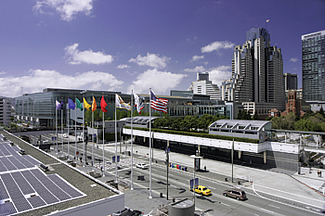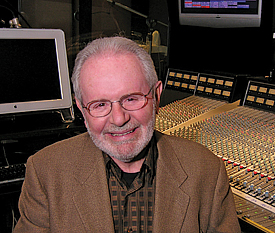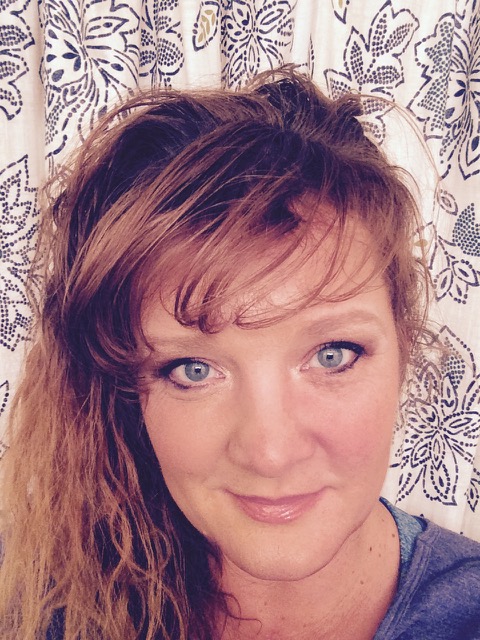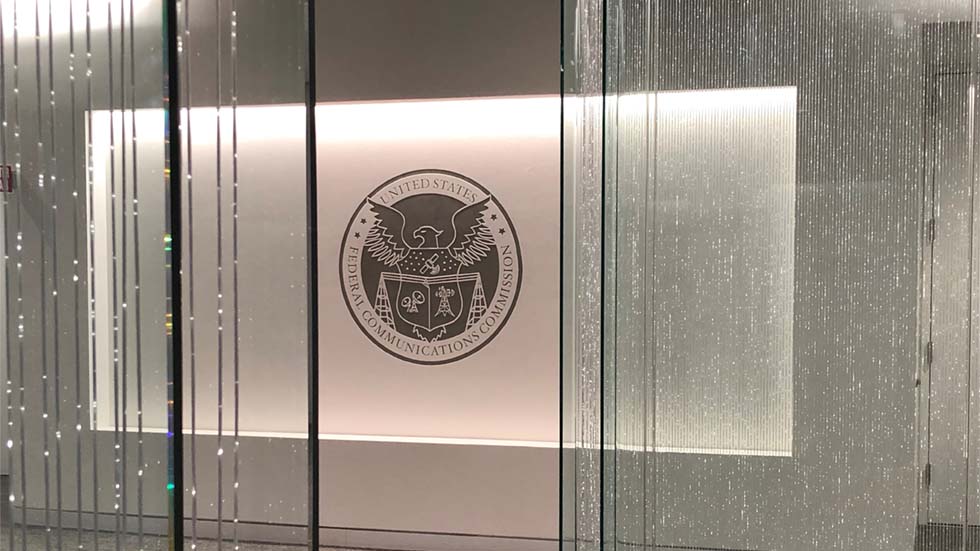AES Offers to Make Smart Connections
SAN FRANCISCO
To address the most compelling issues facing the pro audio industry, the 125th AES Convention rolls into San Francisco, Oct. 2–5—with a close eye on DTV audio, Internet streaming and mobile handheld broadcasting—and an underlying goal of boosting up the dwindling next-generation rank of audio engineers.
That busy dossier is due in part to the evolving nature of the audio industry. This year's AES convention hopes to entice attendees with updates on standards issues and detailed technology presentations while mixing in a dose of light-hearted real-world events—be it an organ concert in a cathedral or a visit to George Lucas' studio—to "emphasize that this is much more than a gear-head event," said AES Convention committee co-chair John Strawn.
INSIDER'S TAKE

The Moscone Center in the heart of San Francisco will host the 125th AES, Oct. 2-5. Broadcast for audio is only one segment of the convention, which will also touch upon such wide-ranging topics as audio for video gamers and the importance of loudspeaker optimization in a live concert venue.
But those mirroring industries can serve as a reminder of what the audio industry as a whole is up against.
Take the recording industry, for example. As its official keynote speaker, AES will bring in a music industry veteran who will offer an insider's take on the recording industry. In short, tried-and-true methods to calculate success are no longer applicable in today's technologically advanced, computer-driven technology.
"Chris has been around a long time, and has watched the industry as it's changed," Strawn said, referring to Chris Stone, a record producer and AES's keynote speaker. "You don't need a major [record] label and expensive recording studio any longer to stamp out a record."
With PC-based editing technology at the average consumer's fingertips and the Internet as a distribution outlet, the future role of highly qualified yet expensive recording engineers can look a bit doubtful. "Chris will look at the economics, and at how to address the current system," Strawn said, "so that [professionals] can survive in the current market.
"The economics have changed drastically," he added.
And so it is for the entire audio industry.
"This convention revisits issues that continue to impact heavily on the broadcast sector even as they evolve through an ongoing chain of permutations," said David K. Bialik, chair of the AES Broadcast Committee.
MOBILE DTV
As part of its broadcast audio focus, AES will take a close look at the evolving broadcast audio industry with a series of workshops, special events and panels that highlight the changing nature of the industry. One of the more heavily attended sessions is certain to revolve around the development of the new mobile handheld broadcasting standard. At the session titled "Mobile/Handheld Broadcasting—Developing a New Medium," panelists from PBS, Sinclair Broadcast Group, Cox Broadcasting and others will look at the standards under consideration by the ATSC, and what steps are being undertaken by professional and consumer groups to bring the technology to fruition. The show will also highlight ongoing, persnickety technical issues that continue to vex audio engineers, such as the control and measurement of loudness levels, and how the next-generation of technological options might finally offer an industry-wide solution.

Chris Stone, veteran record producer, will keynote this year's AES. As the last AES convention before the industry's final transition to digital broadcasting, the convention will look at the difficulties created by audio in DTV. In the "DTV Audio" roundtable, four experts from different stages of the broadcast chain will look at issues surrounding system failure, control problems and design options.
The broadcast audio conference will also touch on facility design issues, Internet streaming, audio transportation, the art of sound effects and the oft-overlooked issue of "listener fatigue" and its impact on listener retention.
As a key promoter of audio engineering standardization work, proposed papers will tackle issues such as the ongoing standardization issues surrounding delay problems. The convention also isn't afraid to take a look back at what came before: one discussion will delve into clandestine wireless development during World War II.
ECLECTIC MIX
The AES has often resounded positively with attendees, especially the technocrats from nearby Silicon Valley, due to the convention's eclectic mix of engineering-rich workshops and real-world special events that put attendees in touch with the technologies they've just heard about. One such event will be a discussion of four newly located "phonautograms," which are the first instruments able to record airborne sounds and then play them back. These four recordings were recently recognized as the world's very first audio recordings, made in Paris in April 1860 by a Frenchman a full 17 years before Thomas Edison invented the phonograph. Audio historian David Giovannoni is expected to give attendees the chance to hear those first recordings.
The AES convention has also evolved to address real-world issues like audio for video game development with workshops like "Navigating the Technology Mine Field in Game Audio." "Games are now a dominant audio sector of production/post production growth, and clearly warrant in-depth study," said AES Workshops co-chair Joe Carter.
In the hopes of further immersing attendees, this year's convention will also usher in lunchtime keynote events from entrepreneurs and record producers who will discuss the ways in which traditional engineers can play a meaningful role in the ongoing evolution of the industry.
AES will also offer a set of Live Sound seminars and technical tours that include a visit to Dolby Laboratories, a behind-the-scenes look at the San Francisco Conservatory of Music $80 million complex and a tour of filmmaker George Lucas' Industrial Light & Magic digital arts complex.
To boost interest in audio in the next-generation of engineers, the convention will also focus on career development with one-on-one mentoring and a design competition for audio engineering students. The exhibition will include several hundred exhibitors that include the likes of Dolby, Gefen, Sennheiser, Zaxcom and Analog Devices.
To register for AES, visit aes.org
Get the TV Tech Newsletter
The professional video industry's #1 source for news, trends and product and tech information. Sign up below.
Susan Ashworth is the former editor of TV Technology. In addition to her work covering the broadcast television industry, she has served as editor of two housing finance magazines and written about topics as varied as education, radio, chess, music and sports. Outside of her life as a writer, she recently served as president of a local nonprofit organization supporting girls in baseball.

